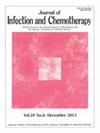急性淋巴细胞白血病患者罕见的嗜碳细胞吞噬菌血症。
IF 1.5
4区 医学
Q3 INFECTIOUS DISEASES
引用次数: 0
摘要
唾液吞噬菌是一种常见于人类口腔的细菌,在免疫功能低下的患者中很少引起机会性感染。本病例涉及一名患有急性淋巴细胞白血病的40岁男性,于2001年被诊断出来,他接受了两次造血干细胞移植,在近20年的时间里经历了复发和缓解。由于他的急性淋巴细胞白血病是难治性的,他不再接受积极治疗,而是接受支持性护理。在这种情况下,他出现了发热性中性粒细胞减少症并伴有口炎,血培养中检测到脓杆菌。头孢吡肟无效,但他唑巴坦/哌拉西林改善了患者的症状。结果发现,该菌株含有抗药基因Capnocytophaga sputigena β-内酰胺酶1 (CSP-1)、cfxA3和erm(F)。CSP-1和cfxA3基因同时存在是罕见的。自标准药敏试验为c。因此,建立标准药敏试验对合理治疗脓毒杆菌具有重要意义。医生应考虑痰源梭菌可能是口腔黏膜损伤所致发热性中性粒细胞减少的致病微生物。本文章由计算机程序翻译,如有差异,请以英文原文为准。
Rare Capnocytophaga sputigena bacteremia in a patient with acute lymphoblastic leukemia
Capnocytophaga sputigena, a species of bacteria resident in the human oral cavity, can rarely cause opportunistic infections in immunocompromised patients. The present case concerns a 40-year-old man with acute lymphoblastic leukemia, diagnosed in 2001, who underwent two hematopoietic stem cell transplants and had experienced relapses and remissions over nearly a 20-year period. Because his acute lymphoblastic leukemia was refractory, he was no longer receiving active treatment and was instead managed with supportive care. Under these circumstances, he developed febrile neutropenia with stomatitis, and C. sputigena was detected in blood culture. Cefepime was ineffective, but the patient's symptoms improved with tazobactam/piperacillin. The isolate was found to harbor the resistance genes Capnocytophaga sputigena β-lactamase-1 (CSP-1), cfxA3, and erm(F). The simultaneous presence of both CSP-1 and cfxA3 genes is rare. Since standard drug susceptibility testing for C. sputigenahas not yet been established, it is important to establish a standard drug susceptibility test for the appropriate treatment of C. sputigena. And physicians should consider the possibility that C. sputigena may be the causative microorganism in febrile neutropenia associated with oral mucosal injury.
求助全文
通过发布文献求助,成功后即可免费获取论文全文。
去求助
来源期刊

Journal of Infection and Chemotherapy
INFECTIOUS DISEASES-PHARMACOLOGY & PHARMACY
CiteScore
4.10
自引率
4.50%
发文量
303
审稿时长
47 days
期刊介绍:
The Journal of Infection and Chemotherapy (JIC) — official journal of the Japanese Society of Chemotherapy and The Japanese Association for Infectious Diseases — welcomes original papers, laboratory or clinical, as well as case reports, notes, committee reports, surveillance and guidelines from all parts of the world on all aspects of chemotherapy, covering the pathogenesis, diagnosis, treatment, and control of infection, including treatment with anticancer drugs. Experimental studies on animal models and pharmacokinetics, and reports on epidemiology and clinical trials are particularly welcome.
 求助内容:
求助内容: 应助结果提醒方式:
应助结果提醒方式:


